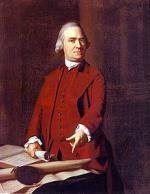Disable ads!
Samuel Adams
Samuel Adams (September 27 [O.S. September 16] 1722 – October 2, 1803) was an American statesman, political philosopher, and one of the Founding Fathers of the United States. As a politician in colonial Massachusetts, Adams was a leader of the movement that became the American Revolution, and was one of the architects of the principles of American republicanism that shaped the political culture of the United States. He was a second cousin to President John Adams. Born in Boston, Adams was brought up in a religious and politically active family. A graduate of Harvard College, he was an unsuccessful businessman and tax collector before concentrating on politics. As an influential official of the Massachusetts House of Representatives and the Boston Town Meeting in the 1760s, Adams was a part of a movement opposed to the British Parliament's efforts to tax the British American colonies without their consent. His 1768 Massachusetts Circular Letter calling for colonial non-cooperation prompted the occupation of Boston by British soldiers, eventually resulting in the Boston Massacre of 1770. To help coordinate resistance to what he saw as the British government's attempts to violate the British Constitution at the expense of the colonies, in 1772 Adams and his colleagues devised a committee of correspondence system, which linked like-minded Patriots throughout the Thirteen Colonies. Continued resistance to British policy resulted in the 1773 Boston Tea Party and the coming of the American Revolution. After Parliament passed the Coercive Acts in 1774, Adams attended the Continental Congress in Philadelphia, which was convened to coordinate a colonial response. He helped guide Congress towards issuing the Continental Association in 1774, the Declaration of Independence in 1776, and helped draft the Articles of Confederation and the Massachusetts Constitution. Adams returned to Massachusetts after the American Revolution, where he served in the state senate and was eventually elected governor. Samuel Adams later became a controversial figure in American history. Accounts written in the 19th century praised him as someone who had been steering his fellow colonists towards independence long before the outbreak of the Revolutionary War. This view gave way to negative assessments of Adams in the first half of the 20th century, in which he was portrayed as a master of propaganda who provoked mob violence to achieve his goals. Both of these interpretations have been challenged by some modern scholars, who argue that these traditional depictions of Adams are myths contradicted by the historical record.
 Read more on wikipedia.org Read more on wikipedia.org
 All quotes by Samuel Adams All quotes by Samuel Adams
 Edit Edit
|

|
|
|
|
|
Background photo by Giuliana
|